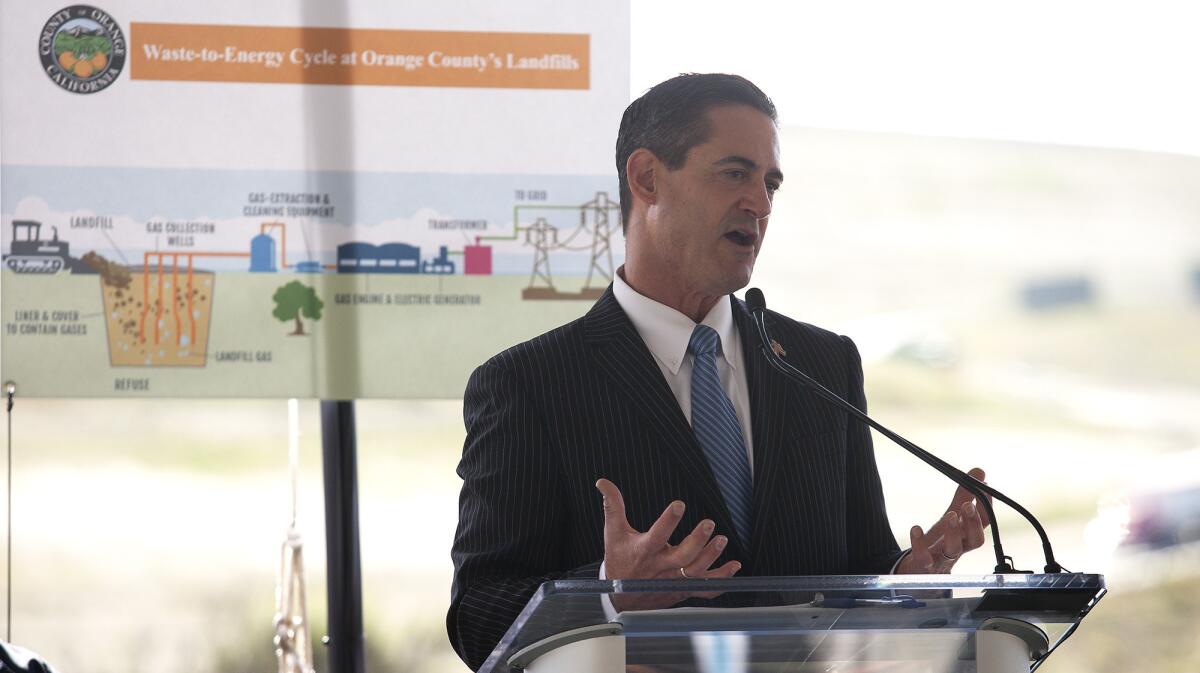Portable restrooms for the homeless lack county board’s support, Supervisor Spitzer says

- Share via
Not enough Orange County supervisors support portable restrooms at a homeless camp along the Santa Ana River to get them approved, according to Supervisor Todd Spitzer.
“There is not a board majority at this time to support issuing an encroachment permit,” Spitzer told Voice of OC after last week’s Board of Supervisors meeting, where several homeless advocates urged supervisors to waive a $2,000 application fee and allow advocates to install restrooms they purchased.
“I am working on an alternative plan, but I need some more time, and I’m hoping to come back to the board [with it] in a couple weeks,” Spitzer said.
The rest of the supervisors didn’t return phone messages asking their positions. They held a closed-door discussion of the issue last Tuesday.
The controversy centers on a large homeless encampment near Angel Stadium, which homeless advocates say is a last resort for people amid a severe shortage of shelter beds and affordable housing.
Homeless people along the river currently lack restroom access at night, and county shelters that have restroom access for those who stay there are either full or close to capacity each night.
Given that reality, advocates say people living along the river often go to the bathroom in buckets, bags and other improvised containers, which risks spreading diseases.
After county supervisors declined requests to place restrooms along the riverbed, advocates raised money on their own and purchased three porta-potties, which they placed along the riverbed until county officials ordered them removed due to lack of a permit.
Advocates have been seeking that permit, and say they’ve met the county’s requirements for a $1-million insurance policy and maintenance agreement for the restrooms.
At last week’s supervisors meeting, several public commenters asked supervisors to waive a $2,000 nonrefundable fee to apply for the permit and to allow the porta-potties.
“I don’t understand why it is a health and safety hazard to have porta-potties down there, when they are going [to the bathroom] in the riverbed which drains to our oceans, which I’m pretty sure most people in this room use,” said Huntington Beach resident and activist John Safari. “It’s more of a health and safety hazard for the entire county for the county to not have restrooms down there.”
Spitzer supported the request, publicly offering to pay the $2,000 fee himself, and holding up what he said was his personal checkbook.
“If the $2,000 is the obstacle to bringing humanity to the riverbed while we figure out what the short- and long-term solution is, I will personally pay for it,” Spitzer said.
Supervisor Andrew Do pushed back, saying the porta-potties could create other problems.
“Once we have porta-potties out there, then it leads to public safety concerns,” Do said. “When you have structures that are enclosed at night in areas that are not patrolled by law enforcement … what happens if something bad [happens] in there?”
Additionally, Do said, if the county converts the riverbed into a home, or “domiciliary,” the U.S. Army Corps of Engineers, which has some jurisdiction over the riverbed, “may come down and may say, ‘Hey you are violating some kind of regulation as far as the use [of] that space.’ ”
Supervisor Lisa Bartlett said she agreed “wholeheartedly” with Do, but that a more comprehensive discussion would have to take place among supervisors.
“This is something that has to be addressed by the entire Board of Supervisors, and I know that we have an item on our closed session today,” Bartlett said.
Advocates followed up that day by sending Spitzer’s staff copies of the agreements he requested.
But after the closed session, Spitzer said while he agrees there’s an “immediate” need for restrooms, there simply weren’t enough votes for the permit and he wouldn’t be wasting $2,000 on the application.
A legal expert questioned whether the supervisors were legally allowed to discuss the restrooms situation in closed session in accordance with the state’s opening meetings law.
“The Brown Act limits the events that can trigger a closed session to discuss a litigation threat, and none of them seems to fit here,” Terry Francke, general counsel of the open-government group Californians Aware, said in an email.
“ ‘Someone might sue us’ is a straight ticket to unlawful secrecy,” he wrote.
The County Counsel’s office declined to comment through a spokeswoman.
Spitzer, meanwhile, says he was advised by county counsel that the bathroom situation is related to ongoing lawsuits about the riverbed encampment. However, none of the lawsuits are known to involve restroom access issues.
There’s also a dispute over who gets to decide whether to allow the restrooms.
While Spitzer said it’s up to supervisors, county staff say it would be a staff-level decision.
“OC Development Services staff review and approve encroachment permit applications,” said Jennifer Nentwig, a spokeswoman for the county CEO’s office. “They review each encroachment permit request against the applicable existing county, state and federal regulations.”
Meanwhile, the advocates say they will continue to fight for restroom access along the riverbed.
This story was reported by Voice of OC, a nonprofit investigative newsroom, as part of a publishing agreement with TimesOC. Nick Gerda covers county government and Santa Ana for Voice of OC. You can contact him at ngerda@voiceofoc.org.
All the latest on Orange County from Orange County.
Get our free TimesOC newsletter.
You may occasionally receive promotional content from the Daily Pilot.






